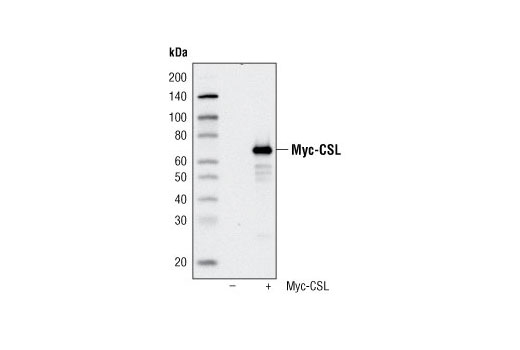IP
All
Transfected Only
Mouse IgG2a kappa
Product Information
Product Usage Information
| Application | Dilution |
|---|---|
| Immunoprecipitation | 1:20 |
Storage
Specificity / Sensitivity
Myc-Tag (9B11) Mouse mAb (Magnetic Bead Conjugate) detects exogenously expressed proteins containing the Myc epitope tag. This antibody recognizes the Myc tag fused to either the amino or carboxy terminus of targeted proteins in transfected cells. Myc-Tag (9B11) Mouse mAb (Magnetic Bead Conjugate) detects exogenously expressed Myc-tagged proteins in cells expressed under a CMV promoter. Expression under other promoters has not been evaluated.
The antibody may cross-react with c-myc protein. The antibody may weakly cross-react with a protein of unknown origin ~90kDa.
Species Reactivity:
All Species Expected
Source / Purification
Monoclonal antibody is produced by immunizing animals with a synthetic peptide corresponding to residues 410-419 of human c-Myc (EQKLISEEDL).
Product Description
Background
Epitope tags are useful for the labeling and detection of proteins using immunoblotting, immunoprecipitation, and immunostaining techniques. Because of their small size, they are unlikely to affect the tagged protein’s biochemical properties.
The Myc epitope tag is widely used to detect expression of recombinant proteins in bacteria, yeast, insect, and mammalian cell systems (1).
Species Reactivity
Species reactivity is determined by testing in at least one approved application (e.g., western blot).
Applications Key
IP: Immunoprecipitation
Cross-Reactivity Key
H: human M: mouse R: rat Hm: hamster Mk: monkey Vir: virus Mi: mink C: chicken Dm: D. melanogaster X: Xenopus Z: zebrafish B: bovine Dg: dog Pg: pig Sc: S. cerevisiae Ce: C. elegans Hr: horse GP: Guinea Pig Rab: rabbit All: all species expected
Trademarks and Patents
Limited Uses
Except as otherwise expressly agreed in a writing signed by a legally authorized representative of CST, the following terms apply to Products provided by CST, its affiliates or its distributors. Any Customer's terms and conditions that are in addition to, or different from, those contained herein, unless separately accepted in writing by a legally authorized representative of CST, are rejected and are of no force or effect.
Products are labeled with For Research Use Only or a similar labeling statement and have not been approved, cleared, or licensed by the FDA or other regulatory foreign or domestic entity, for any purpose. Customer shall not use any Product for any diagnostic or therapeutic purpose, or otherwise in any manner that conflicts with its labeling statement. Products sold or licensed by CST are provided for Customer as the end-user and solely for research and development uses. Any use of Product for diagnostic, prophylactic or therapeutic purposes, or any purchase of Product for resale (alone or as a component) or other commercial purpose, requires a separate license from CST. Customer shall (a) not sell, license, loan, donate or otherwise transfer or make available any Product to any third party, whether alone or in combination with other materials, or use the Products to manufacture any commercial products, (b) not copy, modify, reverse engineer, decompile, disassemble or otherwise attempt to discover the underlying structure or technology of the Products, or use the Products for the purpose of developing any products or services that would compete with CST products or services, (c) not alter or remove from the Products any trademarks, trade names, logos, patent or copyright notices or markings, (d) use the Products solely in accordance with CST Product Terms of Sale and any applicable documentation, and (e) comply with any license, terms of service or similar agreement with respect to any third party products or services used by Customer in connection with the Products.
